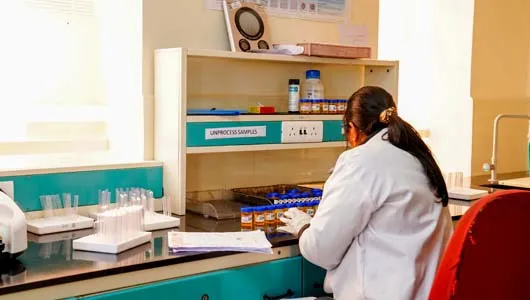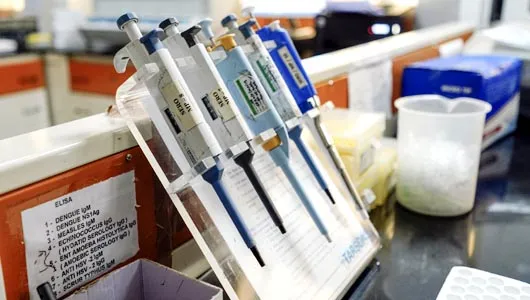
Laboratory
At Himalayan Hospital, NABL accredited state of the art laboratories designed with the latest technology and world-class equipment help in identifying the minutest anomalies in the body. Department of Laboratory Medicine at Himalayan Hospital handles all patients requiring diagnostic analysis & preventive tests. Automated machines conduct all procedures with a check on quality results.
Blood, Urine, Feces, Body fluid like Cerebrospinal fluid (CSF), Peritoneal fluid (Ascitic fluid), Synovial fluid, Sputum and sweat, operated part of the body, Biopsy materials, Bone marrow and Renal calculi are examined for effective diagnosis of diseases.
With an array of scans and procedures, we are equipped to identify any condition in the body and treat it as per the patient’s medical requirements
We have a modern labs that offers various diagnostic facilities in the areas of
| Clinical Biochemistry | Clinical Pathology |
| Microbiology | Serology |
| Histopathology | Cytopathology |
| Haematology | Metabolic disorders |
| Toxicology | Transfusion Medicine |


-
Histopathology & Cytopathology
The sub-speciality deals with giving opinion on specimens from Cardiology, Urology, Gastroenterology, Respiratory Medicine, Orthopaedics, Neurology, Transplant unit, Oncology etc. The department of Histopathology & Cytopathology give the diagnostic & prognostic applications related to the field of oncology.
-
Hematology
The sub-speciality caters to providing comprehensive diagnosis of haematological disorders. The division of haematology specializes in conducting routine lab tests and provides study of haemolytic, haemostatic & oncologic disorders.
-
Microbiology
The facilities of automated blood culture and its continuous monitoring for early and accurate diagnosis of sepsis are available at the department of Microbiology.
-
Serology
Serological tests for the infectious diseases such as Hepatitis markers, HCV, HIV, typhoid, autoimmune panels, and critical care assessment markers are done.
-
Biochemistry
Routine Biochemical, tumour markers Rochee411 and hormone assay tests are carried out.
-
Clinical Pathology
Deals with analysis of body fluid samples including urine, stool, semen etc.
-
Hematology Lab
This lab specializes in testing blood samples to diagnose and monitor blood disorders, such as anemia, leukemia, and clotting disorders.
-
Microbiology Lab
This lab is responsible for identifying microorganisms in patient samples, such as bacteria, viruses, and fungi, to diagnose and treat infections.
-
Chemistry Lab
This lab analyzes blood, urine, and other body fluids to measure levels of various chemicals and substances in the body, such as electrolytes, glucose, and cholesterol.
-
Immunology Lab
This lab performs tests to evaluate the body's immune system, including tests for autoimmune disorders, allergies, and infectious diseases.
-
Pathology Lab
This lab analyzes tissue samples obtained through biopsies or surgeries to diagnose cancer and other diseases.
-
Blood Bank
This specialized lab collects tests, and stores blood and blood products, such as plasma and platelets, for transfusions and other medical procedures.
-
Cytology lab
This lab examines cells obtained from body fluids or tissue samples to diagnose diseases such as cancer, infections, and inflammatory conditions.
-
Diagnosing Diseases and Conditions
Hospital labs use a wide range of tests, including blood tests, urine tests, and tissue biopsies, to diagnose diseases and conditions. These tests can help doctors determine the most effective treatment plan for the patient.
-
Monitoring Patients' Health
Hospital labs provide regular monitoring of patients' health through tests, such as blood glucose or cholesterol levels. This allows doctors to adjust treatment plans as needed to ensure that patients are receiving the appropriate care.
-
Guiding Treatment Decisions
Lab test results provide crucial information that guides doctors in their treatment decisions. For example, lab tests can help doctors determine the appropriate dosage of medication or the duration of a particular treatment.
-
Administering Therapeutic Services
Hospital labs can provide therapeutic services, such as infusions of clotting factors or chemotherapy drugs, to patients in a safe and sterile environment.
-
Monitoring Treatment Effectiveness
Hospital labs can monitor the effectiveness of treatments over time by conducting regular tests to assess changes in patients' health status. This helps doctors determine if treatment adjustments are necessary.

